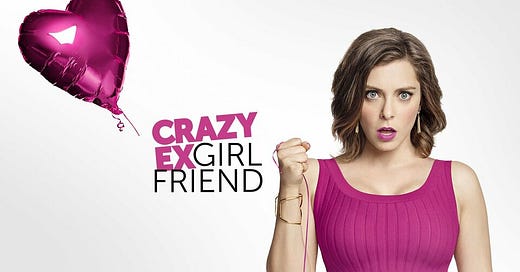Healing Through relatable TV: How Crazy Ex-Girlfriend Made Me Cry, Laugh, and Feel Seen
Watching Rebecca Bunch's journey—from boy-crazy woman-child to self-aware, functional adult—was equal parts hilarious, touching, and deeply validating.
There's something uniquely healing and validating about a relatable TV show. For me, this came from binge-watching all four seasons of Crazy Ex-Girlfriend. I saw so many parts of myself in the storyline and characters—particularly in Rebecca Bunch. Like Rebecca, I spent my 20s overwhelmed by maladaptive coping mechanisms, chasing love and validation from the boys I developed obsessions for (or "limerent objects"), with the constant anxiety and drama that ensued.
The show is an incredibly compelling character (and clinical) study of the boy-crazy, quirky, and lovable protagonist, Rebecca Bunch, who, after years of self-sabotage and unhealthy patterns of behavior, is finally diagnosed with Borderline Personality Disorder (BPD). This diagnosis sets her on a courageous journey of self-discovery, growth and healing, where she begins to truly understand herself for the first time.
While I never took my antics as far as she did, and the details of my story are quite different in many ways, Rebecca's journey—from hitting emotional rock bottom to finally getting the support and diagnosis she needed—struck an uncannily deep chord. Watching her acknowledge her patterns, take responsibility for her actions, seek support, and learn to communicate healthily and set boundaries was not only thoroughly entertaining but also profoundly resonant. Her story made me feel seen, understood, and less alone, just I’m sure it has for countless other fans.
I especially loved witnessing the stages and realizations of Rebecca’s growth, brought to life through hilarious and self-deprecating musical numbers. I laughed and wept as I saw myself in her moments of triumph and vulnerability. I felt deeply validated when she stood up to her mother and finally set boundaries, reclaiming her agency. I felt seen when she quit her corporate job to redefine success on her own terms. And I felt a quiet solidarity when she decided to take an indefinite break from relationships and focus exclusively on herself.
As someone now on the other side of a similar healing journey, I found Rebecca's therapist’s comforting words about not being "behind" particularly affirming. As she so aptly put it: “It would make sense that you would feel behind. You are a little behind. You have overcome challenges that other people haven’t faced, and you have wisely taken the time to do the hard work. It makes sense that some of your friends might hit early adult milestones before you.”
The musical numbers serve as a window into Rebecca’s psyche, offering an exaggerated yet painfully honest look at her inner struggles and societal pressures. Songs like “You Stupid Bitch” and “Let’s Generalize About Men” transform heavy themes into moments of levity and self-awareness, encouraging viewers to laugh while confronting their own biases or experiences. At the same time, heartfelt ballads like “Face Your Fears” or “Maybe This Dream” deliver emotional punches that linger long after the credits roll.
Beyond Rebecca’s personal arc, the show stands out for its sharp sociocultural commentary on topics like feminism, mental health stigma, toxic relationship tropes, and societal expectations of women, which it tackles with a blend of silliness and sincerity, balancing laugh-out-loud moments with deeply poignant insights. By turning heavy, complex, and often uncomfortable topics into catchy, hilarious, and sometimes heartbreaking songs, the show makes them more accessible and engaging. This creative approach allows the show to balance silliness with sincerity, making its commentary all the more resonant.
Weeks after finishing the show, I found myself still listening to the playlist on repeat, especially the fun, witty, and hilarious numbers. I couldn’t help but burst into song as I went about my day, feeling as though I was starring in my own musical.
All in all, Crazy Ex-Girlfriend is a brilliant, relatable, and wildly entertaining rollercoaster of a musical. It’s a heartfelt testament to the messy, nonlinear process of healing, a celebration of growth, and a comforting reminder that none of us are alone in our struggles. For anyone who has experienced C-PTSD, come from a dysfunctional family, or struggled with maintaining healthy relationships, this show offers both a cathartic laugh and an ugly cry—and it does so with immense heart.



